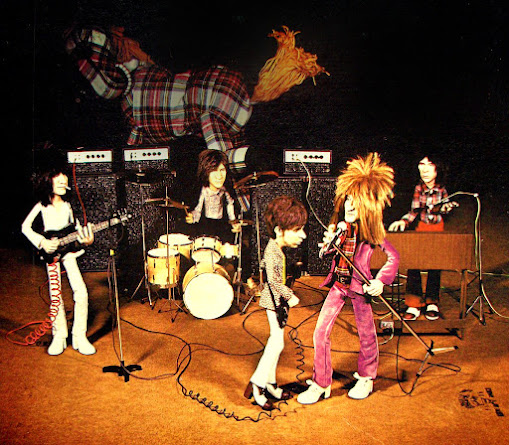#Gentle Giant #Shulman brothers #progressive rock #British prog #eclectic prog #classic prog #hard rock
#experimental rock #jazz rock #neoclassical #medieval #1970s #animated music video
Cool stuff in Gentle Giant songs
This is a listing of interesting musical and lyrical tricks and devices that Gentle Giant used on their albums. Some of them are obvious, while others require careful listening. These sorts of things make Gentle Giant's music so interesting to analyze.
Free Hand
During the verses of Just The Same, the bass and drums are playing in 6/4 while the piano, voice, and guitar are playing in 7/4.
The first section of On Reflection is a four-part vocal fugue. The last section is the same fugue played on instruments. In On Reflection, the last entrance of the band is accompanied by a springy wavering of the pitch (most noticeable in the electric guitar), which is likely the sound of the 24 track tape machine being dropped into "Vari Speed" mode, and the entire end section is transposed (sped up really) by a half step. Both the Studer and the Ampex tape machines, which were popular at the time of Free Hand, make this distinctive noise when you drop them into varispeed.
The bass part at the very beginning of Free Hand is repeated, in a different rhythm and tempo, when the "waltz" section begins (3:55 into the song). In fact, the whole waltz section contains various themes from earlier in the song.
The opening melody of On Reflection and the middle ballad section have almost identical melodies. Compare "In my way did I use you, do you think I really abused you" to "I remember the good things how can you forget."
The opening melody of Talybont is a heavily disguised reworking of the vocal melody of Just The Same. Talybont is a small hamlet in Wales near to where John Weathers lived. Talybont was recorded as the theme song for a movie about Robin Hood. The movie was never released, but it reportedly had "quite well known players in the movie business." If the movie had gone ahead, Gentle Giant would have recorded more material for it. Actually, some of that music did get recorded and appears on Under Construction.
The electronic sounds at the beginning of Time To Kill are from the old videogame, "Pong." And if you listen closely, you can hear one of the guys whisper "go" just before the loud buzz which indicates a goal scored.
The middle of His Last Voyage is a three-part vocal canon. The bass riff in the introduction of His Last Voyage fits over the very classic rock chord progression: I, bVII, bVI, V.
From: https://gentlegiantmusic.com/GG/Cool_stuff_in_Gentle_Giant_songs#Free_Hand
Gentle Giant were a British progressive rock band active between 1970 and 1980. The band were known for the complexity and sophistication of their music and for the varied musical skills of their members. All of the band members were multi-instrumentalists. Although not commercially successful, they did achieve a cult following. The band stated that their aim was to "expand the frontiers of contemporary popular music at the risk of becoming very unpopular” although this stance was to alter significantly with time. Gentle Giant's music was considered complex even by progressive rock standards, drawing on a broad swathe of music including folk, soul, jazz, and classical music. Unlike many of their progressive rock contemporaries, their "classical" influences ranged beyond the Romantic and incorporated medieval, baroque, and modernist chamber music elements. The band also had a taste for broad themes for their lyrics, drawing inspiration not only from personal experiences but from philosophy and the works of Francois Rabelais and R. D. Laing. From: https://en.wikipedia.org/wiki/Gentle_Giant









